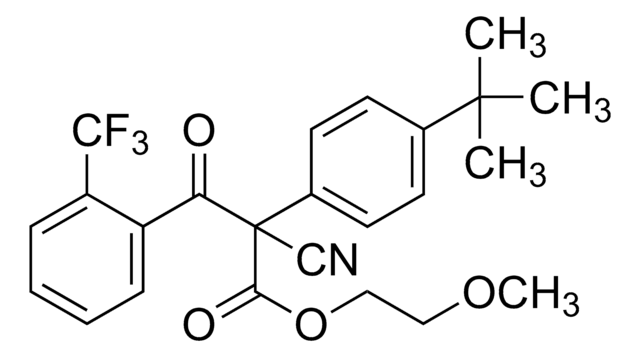36850
Fenoxaprop-P
PESTANAL®, analytical standard
Sinónimos:
(R)-2-{4-[(6-Chlorobenzoxazol-2-yl)oxy]phenoxy}propionic acid
About This Item
Productos recomendados
grade
analytical standard
Quality Level
product line
PESTANAL®
shelf life
limited shelf life, expiry date on the label
technique(s)
HPLC: suitable
gas chromatography (GC): suitable
application(s)
agriculture
environmental
format
neat
storage temp.
2-8°C
SMILES string
C[C@@H](Oc1ccc(Oc2nc3ccc(Cl)cc3o2)cc1)C(O)=O
InChI
1S/C16H12ClNO5/c1-9(15(19)20)21-11-3-5-12(6-4-11)22-16-18-13-7-2-10(17)8-14(13)23-16/h2-9H,1H3,(H,19,20)/t9-/m1/s1
InChI key
MPPOHAUSNPTFAJ-SECBINFHSA-N
¿Está buscando productos similares? Visita Guía de comparación de productos
Categorías relacionadas
Application
Legal Information
signalword
Warning
hcodes
Hazard Classifications
Aquatic Acute 1 - Aquatic Chronic 1 - Repr. 2 - Skin Sens. 1 - STOT RE 2
target_organs
Liver,Kidney
Storage Class
11 - Combustible Solids
wgk_germany
WGK 2
flash_point_f
Not applicable
flash_point_c
Not applicable
ppe
Eyeshields, Gloves, type N95 (US)
Choose from one of the most recent versions:
¿Ya tiene este producto?
Encuentre la documentación para los productos que ha comprado recientemente en la Biblioteca de documentos.
Nuestro equipo de científicos tiene experiencia en todas las áreas de investigación: Ciencias de la vida, Ciencia de los materiales, Síntesis química, Cromatografía, Analítica y muchas otras.
Póngase en contacto con el Servicio técnico











